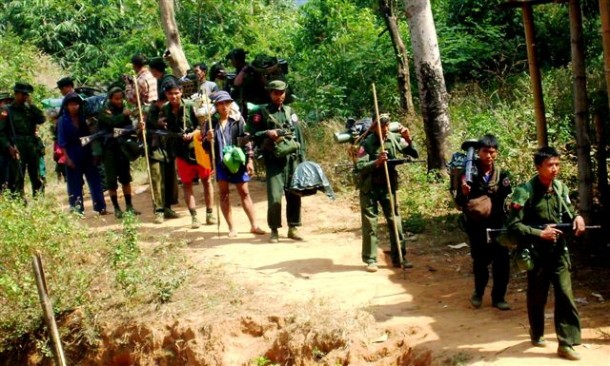Human rights groups insist that forced labor continues to be widely and systematically practiced in Burma in contrast to an upbeat International Labour Organisation (ILO) report deemed key to removing further trade restrictions.
A special sitting on Burma is due to be held on Saturday during the International Labour Conference to review restrictive measures placed in 2000, and an ILO mission this month stated that “there had been a substantial reduction in, or in some cases a cessation of forced labor, particularly in the last few months.”
However, both the Arakan Project and Shan Human Rights Foundation (SHRF) humanitarian groups have rubbished this assessment and claim that forced labor is a part of daily life for many ethnic minorities.
“We have never received any wages, not even a cup of tea, from the army or the Nasaka [Burma border security force] for all the work we do for them year after year. Instead, we are insulted and harassed if we do not work properly,” a 21-year-old Rohingya farm laborer from Buthidaung Township told the Arakan Project.
Positive testimony from the ILO is seen as vital towards negotiating further trade concessions in the wake of the easing of international sanctions—specifically the key inclusion in the European Union and World Trade Organization generalized system of preferences (GSP), which reduces tariffs for developing nations.
However, “Forced Labour Still Prevails: Overview of forced labour practices in North Arakan,” released on Thursday, claims that there has been little progress in northern Arakan State despite a Memorandum of Understanding signed between the Burmese government and ILO in March aiming at the elimination of forced labor by 2015.
This month, the Nasaka requisitioned around 250 villagers from four areas of South Maungdaw on a daily basis to excavate a diversion canal on the Myin Hlut River, claims the Arakan Project report.
The SHRF concurs and said on Thursday that although the ILO’s liaison officer in Burma reported it received “an indication that the military has fully accepted equal responsibility to work within the framework of Burmese laws,” a more careful observation indicates otherwise.
“Many months after the nominally civilian Burmese government came to power, the use of unpaid civilian forced porters by the Burmese army troops in Shan State was still frequent and widespread,” said the SHRF.
“Virtually all the Burmese military patrols that roamed the rural areas of Shan State forcibly conscripted villagers to serve as unpaid guides and porters, often for several days at a time. They also often forcibly took villagers’ livestock and other property and forced civilian porters to carry them, and were quick to find fault with and beat up the villagers.”
A number of nations—including EU members, the United States, Canada and Australia—have or are in the process of lifting trade sanctions on Burma. However, many economists believe that the military-dominated nation will find it difficult to remain competitive without acceptance into the GSP, which is where a favorable report from the ILO becomes crucial.
Under the GSP, developed countries offer non-reciprocal preferential treatment (such as zero or low duties on imports) to products originating in developing countries. Preference-giving countries unilaterally determine which nations and which products are included in their schemes.
In June 2000, the ILO recommended that Burma should be able to “take advantage of [international] relations to perpetuate or extend the system of forced or compulsory labor referred to by the Commission of Inquiry.” Removing these conditions would indicate that forced labor was no longer a major concern under President Thein Sein’s reformist administration.
Yet the Arakan Project reports that children—some as young as nine or 10—make up around a fifth of forced laborers in the north of the state. They are sometimes beaten on the worksite if they do not perform their duty adequately, claims the report, adding that a 10-year-old boy interviewed said he was hit with a stick by a Nasaka officer who had caught him playing in the camp.
“In northern [Arakan] State at least, Myanmar has yet to take concrete steps to effectively implement two key recommendations of the 1998 ILO Commission of Inquiry—eradicate the practice and prosecute perpetrators—and to translate formal commitments into action on the ground in all regions of the country,” said Chris Lewa, director of the Arakan Project. “It would therefore be premature for the ILO to lift the measures adopted in 2000.”

















